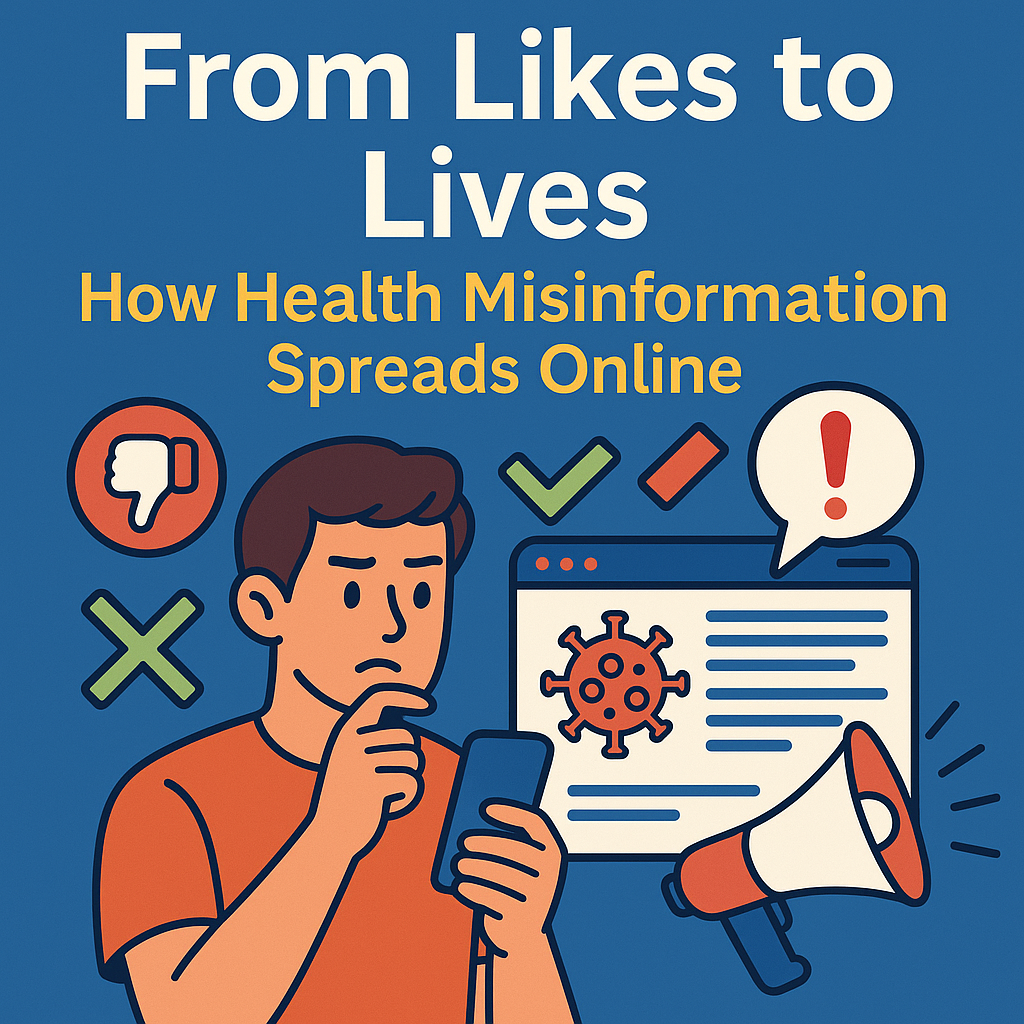📲 From Likes to Lives: How Health Misinformation Spreads Online

Based on: "Understanding the Impact of Health Misinformation on Social Media" (JMIR, 2021)
Have you ever scrolled through your feed and stumbled across a health post that made you stop and think—“Wait, is this actually true?” You’re not alone. With billions of users engaging daily across platforms like Facebook, Twitter, and Instagram, the way we understand health is no longer confined to doctor visits or textbooks—it’s shaped by memes, viral tweets, and influencers. Today’s newsletter explores how health misinformation finds fertile ground online, what dangers it poses, and how digital literacy and strategic interventions can help counter its spread.
We’re diving into findings from a major research review published in JMIR (Journal of Medical Internet Research), which unpacks how health misinformation emerges, spreads, and impacts people’s choices. Let’s unpack it!
📚 What the Research Found
This paper highlights how health misinformation on social media has become a public health issue. Misinformation isn’t just people “getting it wrong”—it can lead to real-world harm like vaccine hesitancy, unsafe herbal treatments, and poor chronic disease management.
Some key findings from the article include:
- Misinformation spreads faster than facts. False or emotionally charged posts are more likely to be shared—often because they evoke strong reactions like fear or anger.
- Vaccine and cancer-related misinformation were the most common and most shared.
- Visuals play a role—images and videos make false claims more persuasive.
- Influencers and community pages tend to spread misinformation more than official health organizations.
- Even people with higher education levels are not immune. Misinformation spreads across demographics and political affiliations.
Researchers emphasized the need to improve health literacy, develop early-warning systems for viral misinformation, and create collaborations between public health bodies and social media companies.

💡 Why This Matters
In the age of COVID-19, monkeypox, and “wellness gurus,” who we trust and how we receive information can be a matter of life or death. Misinformation can:
- Undermine trust in vaccines and science
- Promote dangerous treatments (like bleach drinking or ivermectin misuse)
- Make chronic illness management more difficult
- Lead to poor mental health outcomes due to anxiety or paranoia
For health professionals, public institutions, and even platforms themselves, this research reaffirms the need for timely, accurate communication and tools to flag or reduce the visibility of harmful content.
A great video if you're looking to see how misinformation can impact people.
🔭 Spotlight on the Future
The fight against health misinformation is evolving. Here’s what’s coming next:
- AI-driven detection of misleading posts
- Fact-checker collaborations integrated into platforms (e.g., Meta’s partnerships with third-party checkers)
- Health content labeling, like the “See COVID-19 info center” tag seen on Instagram
- Targeted digital literacy campaigns to teach people how to verify content before sharing
Researchers also call for interdisciplinary partnerships: computer scientists, doctors, sociologists, and educators must work together to create effective counter-strategies.
Check out this podcast for more!
📢 Final Thoughts
We live in an age where you can learn about a new health trend before it even hits the news—and that’s both exciting and risky. The power of social media is massive, but with great power comes great responsibility. As users, we must pause, question, and consider the source before resharing. As content creators and healthcare professionals, we must speak louder, clearer, and more compassionately to make sure facts don't get drowned out.
So the next time you read a post claiming “cinnamon cures diabetes” or “vaccines cause infertility,” ask yourself: Where is the evidence?
Together, we can create an internet that heals, not harms.
🧠 Did You Know?
According to this paper, false health claims are 70% more likely to be shared than true ones!
🤔 Reflection Questions
- Have you ever shared a health post without checking if it was from a credible source?
- How do you decide what health content to trust on social media?
- What tools or habits could help make your online health information diet more accurate?
🔗 References & Further Reading
- JMIR. (2021). Understanding the Impact of Health Misinformation on Social Media. Read the full paper (PDF)
- World Health Organization. Infodemic Management
- Read more from Varrock Street Journal
